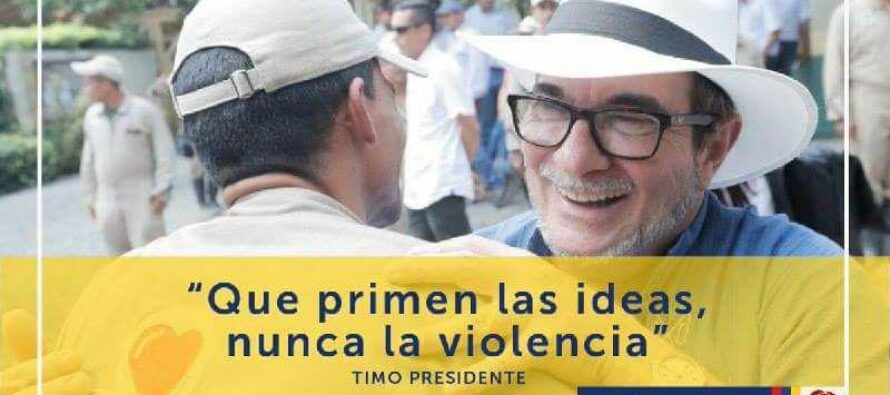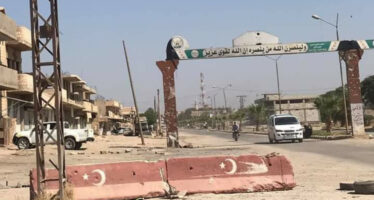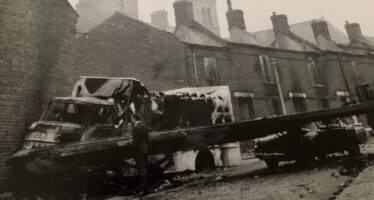Gabriel Angel on Timo’s Great Skills

![]()
One sunny morning in October 1992, in a van that I boarded in the San Jorge neighborhood, south of Bogotá, I was driven by a peasant from the area to San Juan del Sumapaz.
From there I started the trek for several days to a place called La Guitarra, located in the middle of the moor, guided by other travelers I encountered on the way.
Our destination was the same, the camp of Timoleón Jiménez, the youngest member of the National Secretariat of the FARC, a command line trained by Manuel Marulanda and Jacobo Arenas, whom I only knew from photographs. Still remains in my memories the succession of fantastic landscapes that appeared before our eyes.
During the two weeks I spent in that camp surrounded by fog, and located under a huge rock that protected us from the permanent rain, I was called by Timo twice to his improvised office. He wanted to have as much information as possible about the activity of the Front from which I came, the 19th, and based on that, to make decisions that involved my future.
In the second interview he suddenly told me that he had agreed to send me to Magdalena Medio. Surprised, I replied that surely they would kill me there very quickly. I knew of many Front transferees who were dying soon in the new destination, and the Magdalena Medio seemed to me at that time a territory similar to the Vietnam War.
His reaction was calm. He explained that it was not like that, despite what the news said. The people in the guerrilla were dying, in the great majority of cases, for doing things they did not have to do. Each mission had a staff to fulfill it, the fatal error of many was to assume tasks they were not supposed to take on.
Henceforth I never forgot such advice, and I believe that thanks to him I can write this today. In 2010, during the harsh days of constant harassment in the area where El Mono Jojoy was moving, I was teaching a course in philosophy and political economy, in a unit that was suddenly bombed and machine-gunned by hunting jets and harpy helicopters.
When we tried to reach the top of a hill heavily hit by fire, came the order that two squads were left in the skirt, facing with their rifles the machines that attacked us. The shower of lead and bombs was real. I prepared to accompany the boys, when the memory of Timo’s words flashed in my memory.
I had been sent there to teach a course, the veteran fighters were them. I should not confuse my role. I continued with the rest of the squad to the edge where we entrench ourselves to resist, protecting ourselves with the thick roots and trunks of the trees. In the end we left that place, with the balance of several dead and injured. There were broken helicopters and even a dead pilot.
The important thing was that it was possible to abort the enemy landing, which only took place at night in other surrounding hills. The guerrilla, as surely as any human work, is the product of a collective effort, of a cooperation of talents, which often does not seem so obvious, which is why one or the other take the merit.
I think that the great ability of Timo, is to recognize who is who, and to whom each task corresponds at a given time. From then on, he knows how to combine the skills of one and the other very well, in a team effort that ends up producing the expected results.
He never attributes anything to himself, his clarity and modesty prevent him from doing so. He has no personal ambitions.
He just had a heart operation at the Shaio clinic in Bogotá. I have been very close to him in each of the incidents of his health in recent years.
Three years ago, when he suffered a coronary heart attack in Havana, in the middle of an important meeting of the Central Staff of the FARC.
And about eight months ago, when it was affected by transient cerebral ischemia in Villavicencio.
I have seen him emerge from each of them with renewed strength and surprising serenity. This time will be no exception.
In addition, the surgery they performed was not due to an immediate crisis, but to a medical recommendation that aimed to prevent this from happening. His health and optimism were intact when he entered the operating room and when he got out of it.
He invited all his supporters and friends to vote for the Party of the Rose on March 11.
He thanked the medical and assistance staff for everything they did for him.
That is Timo, always clear of what corresponds to do in each moment.
The correctness of his wise guidelines shines even more with time.
We are waiting for him to be back soon.
Related Articles
Turkish-ISIS Belt replaces Arab Belt
![]()
“The demographics of Syria’s most stable and secure lands is being changed by the joint plan of the UN (United
KURDISTAN SENZA TREGUA
![]()
 Torna sulle prime pagine dei giornali il conflitto kurdo-turco. I 26 (o 24 a seconda delle fonti) militari turchi morti in una serie di attacchi simultanei sferrati dai guerriglieri del PKK contro diversi obiettivi delle forze di sicurezza nella zona di Hakkari hanno fatto gridare a una nuova recrudescenza del conflitto. In realtà la guerra non è mai cessata, le operazioni dell’esercito turco non sono mai diminuite. Anzi, da agosto si susseguono bombardamenti in tutta la zona al confine con Iraq e Iran e spesso e volentieri gli F-16 turchi sono entrati nel Kurdistan iracheno colpendo non tanto o non solo le basi del PKK (il Partito dei Lavoratori del Kurdistan) ma soprattutto villaggi facendo molte vittime civili di cui nessuno parla.
Torna sulle prime pagine dei giornali il conflitto kurdo-turco. I 26 (o 24 a seconda delle fonti) militari turchi morti in una serie di attacchi simultanei sferrati dai guerriglieri del PKK contro diversi obiettivi delle forze di sicurezza nella zona di Hakkari hanno fatto gridare a una nuova recrudescenza del conflitto. In realtà la guerra non è mai cessata, le operazioni dell’esercito turco non sono mai diminuite. Anzi, da agosto si susseguono bombardamenti in tutta la zona al confine con Iraq e Iran e spesso e volentieri gli F-16 turchi sono entrati nel Kurdistan iracheno colpendo non tanto o non solo le basi del PKK (il Partito dei Lavoratori del Kurdistan) ma soprattutto villaggi facendo molte vittime civili di cui nessuno parla.
Gli attacchi di ieri hanno suscitato reazioni molto forti, comprensibilmente. A parte il presidente della repubblica, l’islamico Abdullah Gul, che ha promesso “vendetta” e altro sangue, è stato il BDP (Partito della Pace e Democrazia), cioè il partito dei kurdi a fare la prima dichiarazione. “Basta – si legge nel comunicato – con la guerra. E’ tempo che le armi tacciano e si realizzino le condizioni per favorire la pace”. Parole che il BDP va ripetendo da anni ormai. In questo sostenuto dal PKK che (è bene ricordarlo) ha osservato un cessate il fuoco unilaterale fino al 15 giugno di quest’anno. Cioè fino a dopo le elezioni politiche che hanno visto kurdi e sinistra turca eleggere ben 36 deputati al parlamento turco. Quello che è successo dopo questo risultato serve a contestualizzare anche l’attacco di ieri, al quale i turchi hanno risposto con una nuova offensiva aerea in nord Iraq.
Uno dei 36 deputati, Hatip Dicle (in carcere), è stato privato del suo mandato per un ‘reato’ (lui che era già stato deputato con Leyla Zana e aveva già fatto 10 anni di carcere) di natura ‘terroristica’. Cinque deputati sono attualmente in carcere. Al giuramento, dopo un boicottaggio durato tre mesi e mezzo, si sono presentati in 30. Da marzo a oggi sono finiti in carcere qualcosa come ottomila tra amministratori locali kurdi, attivisti per i diritti umani, militanti del BDP con l’accusa di essere in qualche modo legati al PKK. Dal 2009 (anno della vittoria dei kurdi alle amministrative) sono sotto processo oltre quattromila politici kurdi. Dal 27 luglio il presidente del PKK Abdullah Ocalan (in carcere dal 1999 sull’isola di Imrali) non può vedere i suoi avvocati. Un divieto imposto dopo che per mesi uomini del premier Recep Tayyip Erdogan hanno incontrato il leader kurdo per concordare “protocolli di pace” poi gettati nel cassetto.August 1969. It all changed forever
![]()
August 69 was a turning point for the North and for many of us who lived here. The Civil Rights Association had been campaigning for an end to discrimination by the Unionist regime at Stormont




